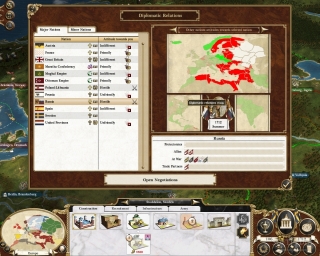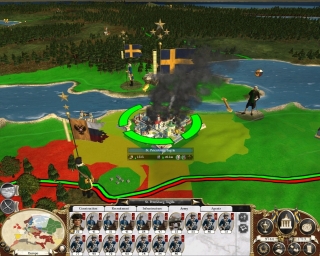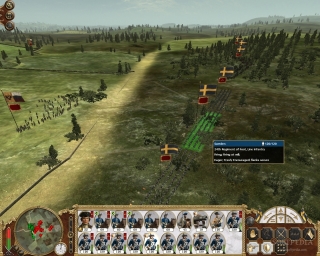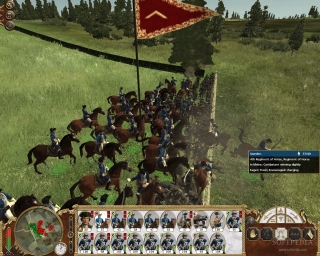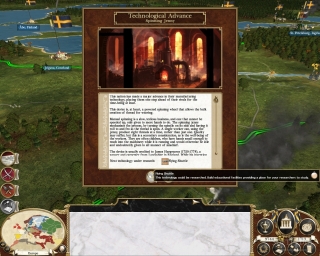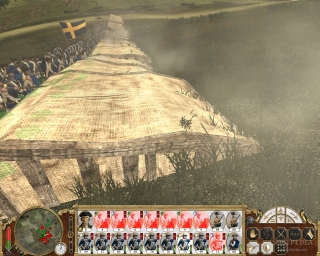One could argue that there are two significantly different periods in the history of the Total War series, as created by Creative Assembly: there are the first two games, Shogun and Medieval, where the strategic map is more of an excuse for players to get into the innovative (at that time) and beautiful tactical battles, and then there are the last three, Rome, Medieval 2 and the recently released Empire, where the tactical battles and strategic map are equally important, leading some players to even ignore the previous releases altogether, playing the entire game as some sort of period-themed empire builder.
Empire is a fine balancing act between the overall strategy and the tactical battles, with a better Artificial Intelligence than its predecessors and with a diplomatic system that works just a little better. There are some significant changes to the way the game is played and there are some good ways in which the series has progressed. If you look at Medieval 2: Total War like the high school years of the franchise, where finesse was necessary but brute force could still win the day, then Empire is where Total War really goes to college. It manages to juggle a lot more stuff, the complexity factor has been taken up and the whole philosophy behind tactical battles has been changed. Get ready to build your empire, if you can get over the lack of stability of the title and if you have the gaming machine to run this hog of a game.
Strategy The strategic map is now much more crowded than in previous games. You have towns, which can be developed to produce wealth, create research or to improve happiness. They can be individually targeted by the enemy and are precious on their own. Each region now has a capital, which has number of building slots and, if conquered, leads to the loss of the entire region. This setup means that there are more locations to look after, which can be a bit unnerving, but Creative Assembly implemented a visual cue to show you which zone needs your attention. Also, be careful what you choose to build in those emerging towns. I would recommend universities and a few new workshops.
On the strategic level, you can engage into diplomacy with other nations, this time without the need for a diplomat, or you can play around with the three types of agents that you have in Empire: Total War. Gentlemen are used to do research when stationed in your nations college's, which makes your military fight better, your towns produce more and your people desire to overthrow you, and can also be used to steal research from the colleges of other factions, which rarely works in my experience, and they can also enter into duels with other gentlemen and rakes to take them out of commission. Rakes are an evolution of the spy. They can assassinate, blow buildings up and spy on armies and cities. Interestingly, they rarely seem to be able to do good infiltration work but they are quite adept at sabotage and killing enemy generals (usually, just before a crucial battle). Don't forget about the fact that you also need to make good use of your religious agents, as religion is crucial in keeping conquered people in line and below revolt level. Don't forget that you can manage the tax level for each region and for the nation to make sure that you keep the population in line.
Do mind the trade and the necessity for a navy. Get those trade ships to South America and Africa to get precious resources while also using a few fleets to keep pirates and potential enemies off your trade lanes. The A.I. seems very anxious to choke your trade income when a conflict starts.
One thing that might stifle players is the scope of the game. Empire simulates three big theaters of war, North America, Europe to the steppes of Russia and North Africa, and the Indian subcontinent. There are also the trade zones and the big stretches of oceans that lie between them all. The size is an advantage, as it guarantees a different experience for playing, let's say, England, then Prussia, then the Ottoman Empire, then the Maratha Confederacy.
Tactics
How much the battlefields have changed! Now, artillery is the queen of the battlefield and massed infantry is the king. A lot of people have thought that battles in the XVIII century would be boring to play and batch, but that's not the case. Players need to be a little more thoughtful in the initial deployment phase, where the use of field works is now available and where a lot of attention is required in creating formations where flanks are protected. As the battles begin, there's quite a lot going on at the same time. The Artificial Intelligence keeps going after cannon like crazy, recognizing their importance in any engagement, so make sure you keep pikemen or line infantry close to them. Also, make sure that you don't abandon all mobility by only using infantry and artillery, as cavalry, while weaker than in Rome and in Medieval 2, is in no way powerless. It's still crucial to flank regiments to break their morale and, as the technology develops, special attention must be paid to taking out cannons, as they tend to shred infantry.
You'll get to use the speed up controls a lot, especially if the enemy chooses to hole up and defend in one corner of the map, which tends to happen if your force is clearly superior. One good improvement is that you don't need to continue playing after you win the battle, in order to make sure that you kill all enemies. Creative Assembly has implemented a system that automatically takes into account all the routing troops that are taken down in the conflict resolution phase. The bad news is that the performance of the tactical A.I., although improved over Medieval 2, can be either challenging or abysmal, depending on reasons that I do not fully understand. The least fun battles I have fought have been those around forts (star forts are the worst) because line infantry apparently has no idea related to how to position itself on the walls (city battles are much better). The most fun battles are those that have varied scenery, with a bit of forest, some buildings and a lot of open space. There, you can truly employ some interesting tactics, including ambushes, flanking and the complex maneuvering of infantry battle lines.
And don't forget about the naval battles. They are taxing on the graphical engine but are beautiful and almost a game onto themselves. You need to aim, determine the type of munition you want to use, the distance at which to engage the enemy, take the wind into account and see whether you'd like to go for hand to hand battle against another ship. Just be aware that there's a nasty graphical bug that can “whitewash” some naval engagements.
Visuals and audio
It's easy to say that Empire: Total War looks better than any other game in the series, because it's so obvious. In the chaos of the land battles, where you're usually zoomed out to give orders and watch plans unfold, you're likely to miss the beauty of the game but you're certainly going to see it in the naval battles, where the majestic ships of the period are torn to pieces by a variety of cannonball types shot out of cannons. Even the water looks good, not in the cartoon-like Red Alert 3, but either murky or shimmering in the Sun, which makes you almost feel the breeze that can lead sailors to victory or defeat. There are also a lot of details on the warriors, on the buildings and the landscape. Just make sure that you have the gaming hardware needed to render all that detail. Otherwise, you can tone down the graphics quality, as gameplay remains as enjoyable without them.
The sound, on the other hand, doesn't seem that great. The thunderous clashes between heavy cavalry and grenadiers seem to lack the impact factor. Cannon sounds more like carbines, and muskets from an entire line of a regiment shooting at the same time sound like a single revolver. It's subdued instead of being heroic; it's limited where it should have been awe-inspiring. Line infantry don't even seem to notice when shells fall in their ranks. There's a chance that they haven't even heard them exploding. Unfortunately, it doesn't seem like the sound will be modified via patches, so let's hope that modders will make the game sound like it should.
Multiplayer At the moment, you can engage anyone in multiplayer in the tactical battles. You can choose your nation, your ground and even the timing for the battle. They're quite fun, as they offer you the chance to see how smart and fun a human opponent can be when compared to the A.I. I've even tried remaking the battles of the American Civil War with some buddies and, with a bit of modding, something really cool could be built using Empire: Total War.
But the big promise coming from Creative Assembly is that it plans to implement a true “multiplayer campaign” in which two players can go up against one another on the strategy map, as well as in tactical battles. The idea is that people would have an option to command the army of the other side in each tactical battle. The good thing is that it would really add a new layer of rivalry to a multiplayer campaign. The bad thing is that a multiplayer campaign would take a really, really long time, probably more than a solo game of Empire: Total War takes.
Another good thing is that Creative Assembly will test out the concepts of the multiplayer campaign through a beta test, which will likely be public and will be hosted by Steam. Look out for more details on that as we get them.
Conclusion
Fans of the Total War franchise and all those who have played Medieval 2 for more than a few turns will like Empire. You can actually lose battles on the Hard difficulty and you'll almost never see a truly dumb move to witness from the Artificial Intelligence. The naval battles, although a bit too complex for their own good, are very good looking and feel important and tough. The diplomacy manages to be a letdown only half of the time, with the other factions actually proposing some interesting treaties. The regional development model is clearly an improvement, as is the addition of technology that needs to be researched, rather than the progression system of the previous games, which was based on increasing the population and building a better castle or town. The game also manages to look better than ever, even if you can't run at the maximum graphics option.
The drawbacks are the high system requirements, that result, surprisingly, not in long load times for battles but in about a minute passing on my machine between turns and the crashes that people are reporting to be experiencing (Creative Assembly has promised and implemented an aggressive patching program). Another thing people seem to hold against Empire: Total War is its complexity. I can only say that I do not want to play videogames in a gaming world that does not value complexity in a strategy title but I see how the relatively limited level of information in the manual and in the tool tips could be an obstacle for some players.
One huge problem that any reviewer worth his/her salt needs to acknowledge is the Artificial Intelligence. I'll say again that it is better than in Medieval 2 and in Rome but it's still a huge letdown, especially considering what fans have heard from Creative Assembly during the development process. It fails to be truly tough in most tactical battles; it's rather coward on the strategic map, inept in diplomacy and cannot use navies to move armies around. But there are two things that it does well: going after cannons with cavalry and blocking trade routes.
That being said, you should buy this game if you like the series or if you liked the tactical battles from the Steam demo and you have a bit of patience with the A.I. and with potential crashes. Don't get it if you're looking for quick battles and little to no management on the strategic layer. Dawn of War II is probably more suited to you. Empire: Total War is for those gamers who like to ponder movements on the campaign map for a few minutes and who are ready to start campaigns that they will probably finish a few months later, playing two to three hours a night.
 14 DAY TRIAL //
14 DAY TRIAL // 
